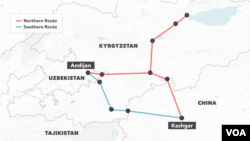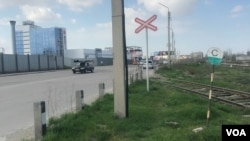Kyrgyz officials remain upbeat about a much-anticipated China-Kyrgyzstan-Uzbekistan railway, but skeptics say odds are stacked against this mega project.
The project, referred to as CKU, dates to 1997, when the three countries signed a memorandum on construction of a railroad to link China's Xinjiang province with the Andijan province of Uzbekistan through Kyrgyzstan's Naryn and Osh provinces.
Kyrgyz officials rolled out a red carpet April 2 for Erkin Tuniyaz, chairman of China's Xinjiang Uighur Autonomous region, who was visiting the Kyrgyz capital, Bishkek, on a two-day tour. The chairman of Kyrgyzstan's Cabinet of Ministers, Akylbek Japarov, used the meeting to showcase progress on the CKU.
"The construction project for China-Kyrgyzstan-Uzbekistan railway is making significant strides forward," Japarov said. He added that representatives from the three countries had met in February to discuss construction plans.
Despite optimism and repeated attempts to start the project — some regional observers have come to call it a "dream railway" — the CKU has stalled as the countries face financing and technical challenges.
Some regional observers also claim that geopolitical considerations have played a role, with Russia and Kazakhstan trying to dissuade China from committing funds to the CKU. Neither Russia nor Kazakhstan has commented on the project.
Kyrgyz president promotes project
The project's fortunes began to change after Russia's early 2022 Ukraine invasion, when Western sanctions against Russia prompted China and the Central Asian republics to look for new transit routes to Europe. In September 2022, during the Shanghai Cooperation Organization's summit in Samarkand, Uzbekistan, the three countries reached a deal to conduct a feasibility study on the railway the next year.
The 2023 study estimated that roughly $4.5 billion would be needed to complete the 454-kilometer (282.1 miles) railway.
Since 2022, the Kyrgyz government has engaged in extensive public outreach to promote the project. In June of that year, Kyrgyz President Sadyr Japarov told Kyrgyz media that construction work on the CKU would begin in 2023.
On his late 2023 visit to the United States and Germany, President Japarov assured the public that the project was making progress, and he called on Western investors to provide financing for the project.
Despite the official assurances, construction work did not start in 2023, and it looks as though it will not begin in 2024 either.
Countries disagree about route
According to experts, the participating countries disagree on the route for the railway. The 2023 feasibility study identified two potential routes: a northern route that would run from China's Kashgar province to Uzbekistan's Andijan province through Kyrgyzstan's Naryn province; and a southern route that would run through Kyrgyzstan's Osh province.
A Bishkek-based expert who spoke to VOA on condition of anonymity said Kyrgyzstan "has been favoring the northern route, which is lengthier, more technically complicated and costly, but this route offers opportunity to connect the country's northern and southern regions."
Kyrgyzstan's north and south are divided by the Ala Too mountain range. The road that links them is often closed because of weather.
"China and Uzbekistan have been supporting the southern route as it is less complicated and less costly," he said.
The expert said that faced with pressure from China and Uzbekistan, Kyrgyzstan is willing to settle on the less costly southern route.
Tunnels, bridges pose challenges
Technical difficulties present another type of challenge. The feasibility study found that more than 50 tunnels and 90 bridges would be needed to navigate through the mountain ranges that lie on the proposed northern route. There is no similar information for the southern route.
Differences in railway track gauge — or width — are also an issue. China uses a 1,435-milimeter track while Kyrgyzstan and Uzbekistan use a broad-gauge 1,520-milimeter track. This means, the expert said, the project would require the construction of unloading stations so passengers and freight could be moved to other train cars, which would increase the cost.
The financing of the project has emerged as a significant obstacle. Initial estimates put the cost at $4.5 billion. The most recent calculations, by the Kyrgyz government, indicate that the project would end up costing roughly $8 billion.
The bulk of financing would go for the 280-kilometer (173.9 miles) Kyrgyz section of the planned 454-kilometer (282.1 miles) railway.
Financial terms still 'a contentious issue'
An October 6 analysis by Caspian Policy Center, a Washington think tank, said, "Although the agenda of the project has been finally settled, financial terms remain a contentious issue. Kyrgyzstan and Uzbekistan lack the financial capabilities to support the project, both facing substantial debts."
"Given the challenging economic conditions of these Central Asian governments," the paper said, "China may be hesitant to provide additional loans for the construction of such multi-billion-dollar projects in Central Asia."
Kyrgyz officials have scoffed at any suggestion that the CKU has been suspended because of financing constraints.
In late October, Kyrgyz Transport and Communications Minister Tilek Tekebaev said that information suggesting that the project had been temporarily suspended "is inaccurate."
"We are actively engaged in discussions with China and Uzbekistan … [and] work will resume once the financing model for the project is finalized. It's essential to approach this extensive project with careful consideration," he said.
In late November, however, Kyrgyz premier Japarov admitted that China was losing interest in the CKU.
"As you know, geopolitics has changed, alliances have changed. All this is an obstacle to the progress of the project," Japarov said at a meeting with Kyrgyz MPs. He added that Kyrgyzstan and Uzbekistan "need this road. And China, our friends, is dissuading us from the project."
Kyrgyzstan determined to build
Despite various obstacles, the Kyrgyz government is not ready to shelve the CKU.
Bakyt Torobayev, deputy chairman of the Cabinet of Ministers of Kyrgyzstan, who was addressing the Global Gateway Investors Forum for EU-Central Asia Transport Connectivity in Brussels in late January, said the CKU was the largest project that modern Kyrgyzstan has undertaken.
"We believe that in the near future, the first railroad link will be laid, marking a significant milestone in realizing this project," he said.
During the November meeting with MPs, Japarov said that Kyrgyzstan earmarked $500 million from its own budget for the CKU.
If the CKU is shelved, the Bishkek-based expert said, "this will cause big public embarrassment to Kyrgyz government," which has invested extensive resources and time in the project.







